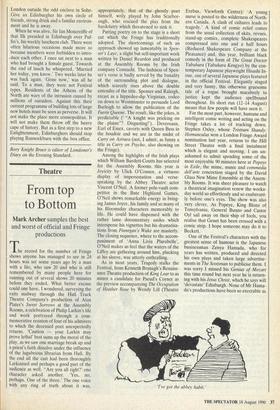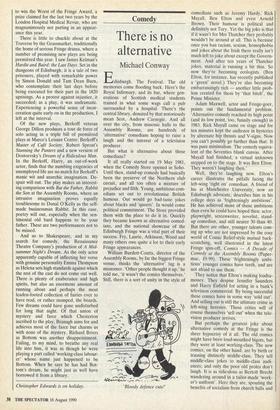Theatre
From top to Bottom
Mark Archer samples the best and worst of official and Fringe productions
The record for the number of Fringe shows anyone has managed to see in 24 hours was set some years ago by a man with a lilo, who saw 20 and who is still remembered by many people here for running out of several shows 20 minutes before they ended. What better excuse could one have, I wondered, surveying the exits midway through the Hull Truck Theatre Company's production of Alan Plater's Sweet Sorrows at the Assembly Rooms, a celebration of Philip Larkin's life and work portrayed through a com- memorative reunion of four of his admirers to which the deceased poet unexpectedly returns. 'Caution — your Larkin may prove lethal' best sums up the moral of the play, as we saw one marriage break up and a priest's faith dissolve under the influence of the lugubrious librarian from Hull. By the end all the cast had been thoroughly Larkinised and perhaps a good part of the audience as well. "Are you all right'?' one character asked another. 'Yes, no, perhaps. One of the three.' The one voice with any ring of truth about it was,
appropriately, that of the ghostly poet himself, wrily played by John Scarbor- ough, who rescued the play from the bardolatry which threatened to sink it.
Putting poetry on to the stage is a short cut which the Fringe has traditionally adopted. The shortcomings of such an approach showed up lamentably in Spen- ser's Laye, a slight but self-important work written by Daniel Reardon and produced at the Assembly Rooms by the Irish company Connacht. The lushness of Spen- ser's verse is badly served by the banality of the surrounding plot and dialogue, which scarcely rises above the double entendre of the title. Spenser and Raleigh, recast as a hippedee-dip Virginian, rodeo on down to Westminster to persuade Lord Burleigh to allow the publication of the Faerie Queene. The result, like the jokes, is predictable (' "A knight was pricking on the plaine"? Disgusting!'). Devereaux, Earl of Essex, cavorts with Queen Bess in the boudoir and we are in the midst of Carry on Astraea (not, I admit, as funny a title as Carry on Psycho, also showing on the Fringe).
Among the highlights of the Irish plays which William Burdett-Coutts has selected for the Assembly Rooms this year is Joyicity by Ulick O'Connor, a virtuoso display of impersonation and verse- speaking by the Abbey Theatre actor Vincent O'Neil. A former pole-vault com- petitor in the Bute Highland Games, O'Neil shows remarkable energy in bring- ing James Joyce, his family and so many of his Bloomsday characters memorably to life. He could have dispensed with the rather lame documentary asides which intersperse his vignettes but his dramatisa- tions from Finnegan's Wake are masterly. The closing sequence, where to the accom- paniment of 'Anna Livia Plurabelle', O'Neil makes us feel that the waters of the Liffey are gathering around him, plucking at his sleeve, was utterly enthralling.
As in most years, Tragedy stalks the Festival, from Kenneth Branagh's Renaiss- ance Theatre production of King Lear to as minor a candidate for Pseud's Corner as the preview accompanying The Occupation of Heather Rose by Wendy •Lill (Theatre Erebus, Viewforth Centre): 'A young nurse is posted to the wilderness of North- ern Canada. A clash of cultures leads to tragedy.' A kind of comic relief comes from the usual collection of skits, revues, stand-up comics, complete Shakespeares compressed into one and a half hours (Reduced Shakespeare Company at the Pleasance) and, this year, brilliant black comedy in the form of The Great Doctor Yabuhara (Yabuhara Kengyo) by the con- temporary Japanese playwright Hisashi In- oue, one of several Japanese plays featured in the official Festival. Elegantly staged and very funny, this otherwise gruesome tale of a rogue brought macabrely to justice kept the audience spellbound throughout. Its short run (12-14 August) means that few people will have seen it.
For the most part, however, humane and intelligent comic writing and acting on the Fringe takes a lot of tracking down. Stephen Oxley, whose Tristram Shandy: Homunculus won a London Fringe Award nomination last year, returns to the Hill Street Theatre with a final instalment which is elegant and moving. I am un- ashamed to admit spending some of the most enjoyable 90 minutes here at Popeye in Exile, the mime, music and commedia dell'arte concoction staged by the David Glass New Mime Ensemble at the Assem- bly Rooms. It was sheer pleasure to watch a theatrical imagination renew the worka- day world so effortlessly and so exuberant- ly before one's eyes. The show was also very clever. As Popeye, King Blozo of Tonsylvania, General Bunzo and Castor Oyl sail away on their ship of fools, you realise that Genet has been crossed with a comic strip. I hope someone may do it to Beckett.
One of the Festival's characters with the greatest sense of humour is the Japanese businessman Zenya Hamada, who for years has written, produced and directed his own plays and taken large advertise- ments in The Scotsman to publicise them. I was sorry I missed his Genius of Mozart this time round but next year he is return- ing with his Jesus Christ, which he says will 'devastate' Edinburgh. None of Mr Hama- da's productions have been so execrable as 'I've got the abbey habit.' to win the Worst of the Fringe Award, a prize claimed for the last two years by the London Hospital Medical Revue, who are magnanimously not putting in an appear- ance this year.
There is little to chuckle about at the Traverse by the Grassmarket, traditionally the home of serious Fringe drama, where a number of promising new plays are being premiered this year. I saw James Kelman's Hardie and Baird: the Last Days. Set in the dungeons of Edinburgh, it is a tale of two prisoners, played with remarkable power by Simon Donald and Tam Dean Burn, who contemplate their last days before being executed for their part in the 1820 uprisings. As a protest against injustice, it succeeded; as a play, it was undramatic. Experiencing a powerful sense of incar- ceration quite early on in the production, I left at the interval.
Of the new plays, Berkoff veteran George Dillon produces a tour de force of solo acting in a triple bill of premiered plays at Marco's Leisure Centre: Berkoffs Master of Café Society, Robert Sproat's Stunning the Punters and a new version of Dostoevsky's Dream of a Ridiculous Man. In the Berkoff, Harry, an out-of-work actor, finds that the numbing exigencies of unemployed life are no match for Berkoffs manic wit and anarchic imagination. De- spair will out. The play makes an interest- ing comparison with Bat the Father, Rabbit the Son at the Assembly Rooms, where an intrusive imagination proves equally troublesome to Donal O'Kelly as the self- made businessman Rabbit. In this case, poetry will out, especially when the sen- timental old bard happens to be your father. These are two performances not to be missed.
And so to Shakespeare, and in my search for comedy, the Renaissance Theatre Company's production of A Mid- summer Night's Dream. As the only actor apparently capable of inflecting her verse with genuine personality Emma Thompson as Helena sets high standards against which the rest of the cast do not come out well. There is plenty of exuberance and high spirits, but also an enormous amount of running about and perhaps the most leaden-footed collection of fairies ever to have trod, or rather stomped, the boards. Few dreams could have gone undisturbed for long that night. Of that union of mystery and farce which Chesterton ascribed to the play, Branagh aims for and achieves most of the farce but charms us with none of the mystery. Richard Briers as Bottom was another disappointment. Failing, to my mind, to breathe any real life into him, it was as though he were playing a part called 'working-class labour- er' whose name just happened to be Bottom. When he says he has had Bot- tom's dream, he might just as well have borrowed it from a library.



























































 Previous page
Previous page